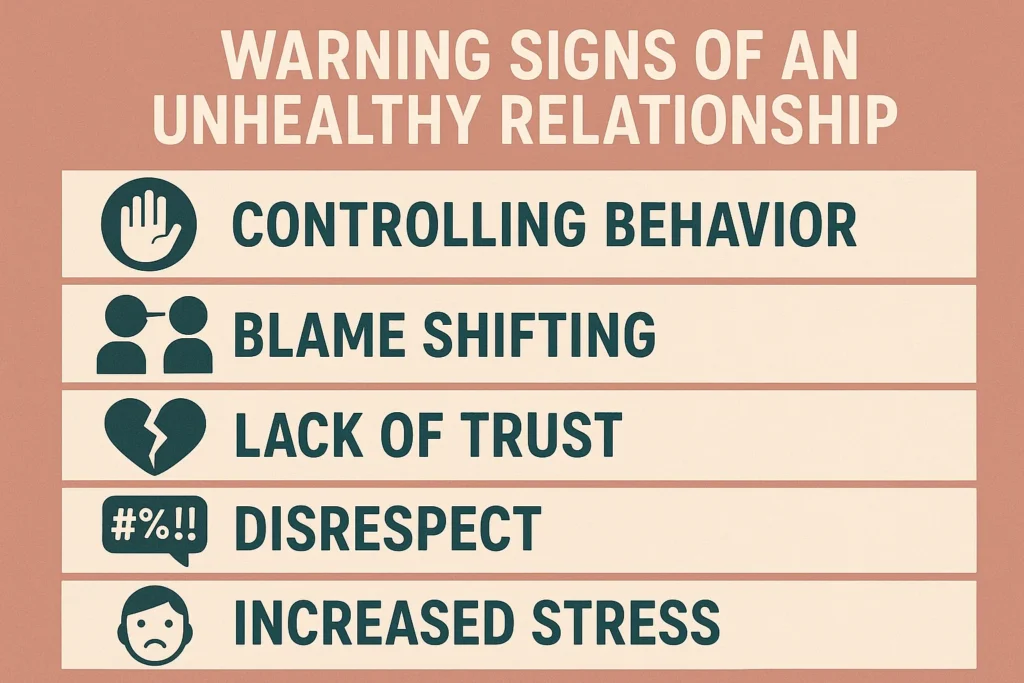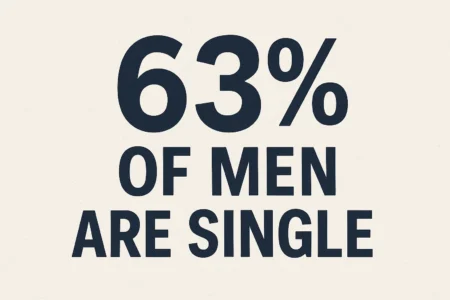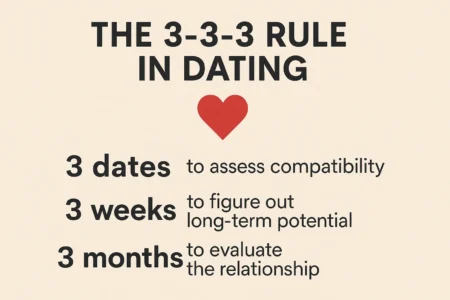Love is supposed to feel safe.
It’s meant to be a soft place to land, a partnership that builds you up and makes you feel more you. But sometimes, it doesn’t. Sometimes, that feeling of safety just… erodes. It’s so slow you barely notice it, until one day you’re left with a knot in your stomach and a constant voice in your head second-guessing everything.
You start to walk on eggshells. You find yourself asking, “Is this normal?” or “Am I crazy?”
You’re not crazy. And you’re not alone.
Figuring out the difference between a rough patch and a truly unhealthy dynamic is one of the most confusing things to go through. That’s why knowing the answer to “What are 5 warning signs of an unhealthy relationship” is so critical. It’s not about blame. It’s about clarity.
This isn’t some simple checklist. These signs are sneaky. They disguise themselves as love, as “caring,” or as “passion.” But at their core, they aren’t about connection. They’re about control.
Key Takeaways
- Trust Your Gut: That “walking on eggshells” feeling? It’s not in your head. If you’re constantly anxious around your partner, that’s the biggest red flag of all.
- Control Isn’t Care: There’s a huge difference. A partner checking your phone, policing your clothes, or monitoring your spending isn’t “protective.” It’s control.
- Isolation is a Tactic: Unhealthy partners often try to cut you off from your friends and family. It makes you more dependent on them, and only them.
- Words Become Weapons: Constant criticism, “jokes” that sting, and belittling comments are all designed to chip away at your self-esteem until you feel worthless.
- Love Isn’t a Transaction: A healthy relationship doesn’t “keep score.” Love shouldn’t be a prize you have to earn by being perfect or “making up for” old mistakes.
Is That “Knot in Your Stomach” Trying to Tell You Something?
Before we get into the list, let’s talk about the biggest warning sign of all.
Your body.
That tight feeling in your chest when you hear their keys in the door. The way you mentally rehearse a simple conversation, trying to find the exact right words to ask for something so you don’t set them off.
That exhaustion. The one that settles deep in your bones, not from a long day at work, but from the long, draining effort of managing someone else’s moods.
That’s your intuition. It’s your body’s alarm system, and it’s probably screaming at you. We just get so good at ignoring it. We rationalize. “He’s just stressed.” “She doesn’t mean it.” “All couples fight.”
But a “fight” and a constant state of anxiety are two completely different things. Healthy relationships feel like a relief. Unhealthy ones feel like a job.
If you’re always on high alert, that’s sign number one. Now, let’s look at the specific behaviors that feed that anxiety.
Warning Sign 1: The “Caring” That Is Really Control
This one is, in my opinion, the most insidious because it starts so subtly. It sounds like love. It feels like they are just so invested in you. But there’s a dark, cold underside to this “investment.”
Control isn’t always a slammed fist or a shouted command.
Often, it’s a slow, creeping vine. It starts with “I just miss you, do you have to go out with your friends again?” That sounds sweet, right? But soon it evolves into “I don’t like those friends, they’re a bad influence.”
It begins with “Let me help you with your budget,” and turns into “Why did you spend $5 on a coffee? That’s stupid.”
Are You Suddenly “Bad” with Money or Decisions?
I remember a time, years ago, I was with someone who wanted a full report on my “coffee budget.” It started as a “joke” about my $5 latte habit. But it wasn’t a joke.
Soon, I was hiding receipts. I felt guilty for buying a simple coffee, something that brought me a tiny bit of joy. It wasn’t long before I just started handing over my paycheck, letting him “manage” it because, he said, I was just “too flighty” with money.
It was never about the $5. It was about him controlling that joy, that tiny piece of my independence.
This can apply to anything:
- What you wear: “That’s too revealing, you’re disrespecting me.”
- Who you talk to: “Why are you texting him? He just wants to get in your pants.”
- Your job: “Are you sure you can handle that promotion? It seems like a lot of stress.”
Does Your Phone Feel Like It’s Not Your Own?
In a healthy relationship, you have privacy. Period. Your partner doesn’t need to read your texts to your sister or your DMs with friends to “make sure” you’re behaving.
This “If you have nothing to hide, you’ll let me look” line is a trap. It’s a test you can’t pass. It reframes a totally reasonable expectation of privacy as a sign of guilt.
It’s not about trust. It’s about surveillance.
Warning Sign 2: The Creeping Isolation
This one works hand-in-hand with control. It’s that “us against the world” mentality, and it sounds so incredibly romantic at first. Like you’re in this special, private bubble that no one else understands.
The problem is, bubbles pop. And what you’re left with is… no one.
An unhealthy partner doesn’t want you to have a strong support system. Why? Because your friends and family are the ones who will call them on their behavior. They’re the ones who will say, “This isn’t right,” or “You don’t seem like yourself lately.”
They are your reality check. And your partner wants to be your only reality.
How Does This Tactic Even Work?
It’s gradual. It starts with your partner pouting or starting a fight every time you make plans to see your best friend. So, you start seeing your friend less. It’s just easier. It keeps the peace.
Then, it’s your family. “Your mom is always so critical of me,” or “We never get any time alone, can’t we just skip Sunday dinner this week?”
Before you know it, you are the only person in your partner’s world, and—more importantly—they have become the only person in yours. This dependency is a terrible, powerful glue. When you have no one else to turn to, no one else to validate your experiences, you start to believe their version of reality.
It’s a self-fulfilling prophecy. They tell you “everyone is against us,” and then they create the conditions for it to be true by making you push everyone away.
Warning Sign 3: The “Jokes” That Are Just Mean
This one hits right at the heart of your self-worth. It’s not one big blow. It’s a thousand tiny papercuts, every single day. These are the belittling comments, the constant criticism, and the “playful” teasing that just leaves you feeling small.
Love shouldn’t hurt.
In a healthy partnership, your partner is your biggest cheerleader. They’re the one person in the world who thinks you are flat-out incredible. In an unhealthy one, they are your harshest critic.
Can You Tell Me What a Backhanded Compliment Sounds Like?
Oh, you know the ones.
“That dress is actually flattering on you.” “Wow, you cleaned the kitchen! I’m shocked.” “You’re so smart… for someone who never went to college.”
They sound almost like compliments, but they leave that bitter aftertaste. The subtext is always, “You’re usually not this good.”
I had a partner once who loved to say things like, “You’d be so pretty if you just lost 10 pounds.” Or, “You’re so ambitious, it’s a little… un-feminine.” He’d say it with a little laugh, so if I got upset, I was the one who couldn’t take a joke.
It took me years to scrub that voice out of my head.
That’s the goal, you see. It’s insidious. It’s not love. It’s an attempt to chip away at your foundation until you’re too small and too insecure to believe anyone else would ever want you. That’s how they keep you. They make you believe you’re unlovable to anyone else.
Are You Always the One to Blame?
Think about your last disagreement. Did you find yourself apologizing for something that wasn’t your fault? Or for a “crime” you didn’t even commit? Unhealthy partners are masters of blame-shifting. They cannot or will not take accountability.
They cheat, and it’s because “you haven’t been paying attention to me.” They yell, and it’s because “you pushed my buttons.”
You end up spending all your energy managing their behavior, their feelings, their reactions. You have no energy left to even consider your own.
Warning Sign 4: The Jealousy That Is Really Possession
In the beginning, a little jealousy can feel… nice. Flattering, even. “Wow, they really care about me.” “They’re just so passionate.”
But there is a Grand-Canyon-sized difference between a partner who feels a momentary pang of insecurity and a partner who uses jealousy as a tool of intimidation and control.
Healthy jealousy is fleeting and internal (“Wow, that person is looking at my partner, I’m so lucky they’re with me”). Unhealthy jealousy is external and accusatory.
It’s not “protection.” It is “possession.”
What Does This Look Like in Real Life?
It’s the constant, rapid-fire questioning.
- “Who was that?”
- “Where were you?”
- “Why were you 10 minutes late?”
- “Why did that guy smile at you?”
It’s your partner “innocently” showing up at your work or at your girls’ night out, just to “check in.” It’s them scrolling through your social media “likes” and starting a fight over a 3-year-old photo you commented on.
This kind of behavior isn’t a sign of their deep love for you. It’s a sign of their deep-seated insecurity, and they’re making it your problem to manage.
So you find yourself changing your behavior to avoid an outburst. You stop talking to your male coworker. You delete a post. You make yourself smaller and your world narrower, all to appease something that can never be appeased.
Warning Sign 5: The “Love” That Keeps Score
A healthy relationship is a team. You’re both playing for the same side. An unhealthy relationship feels like a constant competition. And your partner is always keeping score.
Love feels conditional.
It feels like something you have to earn, every single day. It feels like something that can be taken away at a moment’s notice.
This creates a terrible dynamic. You’re not a partner; you’re a performer, constantly auditioning for the role of “person worthy of love,” and you’re failing every time.
Why Does It Feel Like My Past Mistakes Are Always on Replay?
Does this sound familiar? You’re in a completely unrelated argument—maybe about whose turn it is to take out the trash—and suddenly, they bring up that one thing you did six months ago.
“Well, I may have forgotten the trash, but at least I didn’t embarrass you at your office party last Christmas!”
In a relationship like this, nothing is ever resolved. There is no forgiveness. Every mistake you’ve ever made is saved, cataloged, and filed away to be used as a weapon against you later.
You can’t be vulnerable. You can’t be imperfect. Because you know—you just know—that your imperfections will be ammunition in the next fight.
What About the Silent Treatment? Is That a Sign?
Yes. A thousand times, yes.
The silent treatment is not a person “needing space” to cool off. A healthy person will say, “I’m too angry to talk about this right now, I need an hour.”
The silent treatment is a punishment. It’s a cold, calculated move designed to make you feel invisible and desperate. It’s psychological warfare. By withdrawing all affection and communication, they are purposefully putting you in a state of distress.
They hold the power. They wait for you to break, to crawl back, to apologize for whatever “wrong” you committed.
It’s a cruel power play, and it has no place in a loving relationship.
Okay, I See the Signs. What Do I Do Now?
Recognizing these patterns is a massive, painful, and incredibly brave first step. The “now what” is the hardest part.
You might be feeling a swirl of emotions: shame (“How did I let this happen?”), fear (“What if I leave and they’re right, no one else will want me?”), or just a deep, profound sadness. All of that is valid.
Why Is It So Hard to “Just Leave”?
Everyone on the outside will say it. “He’s terrible, just leave him.” “She’s so mean to you, why do you stay?”
They don’t understand the complex web that’s been woven.
You’re not stupid. You’re not weak.
You may be financially entangled. You may have children. You may be trauma-bonded, which is a real, chemical bond that makes leaving feel like you’re ripping off a part of your own skin.
And you may still love them. You can love the person you fell for and simultaneously hate the person who is hurting you.
Start with One, Small, Safe Step
You don’t have to have a five-year plan tonight. The first step is just to tell one person. One person you trust, who won’t judge you, and who will just listen. A friend, a family member, a therapist.
Just say the words out loud. “I’m worried about my relationship.” “Something doesn’t feel right.”
This does two things. First, it breaks the isolation. It pokes a hole in that “us against the world” bubble. Second, it makes it real. You’ve brought this secret out of the darkness and into the light, and that’s where its power starts to fade.
If you don’t feel safe talking to anyone you know, there are resources. People who will listen, who will believe you, and who can help. You can call the National Domestic Violence Hotline just to talk. You don’t need to be ready to leave. You can just be ready to be heard.
Your story doesn’t have to end this way. You deserve to feel safe. You deserve to be cherished, not criticized. You deserve a love that feels like a soft place to land.
FAQ – What are 5 warning signs of an unhealthy relationship
How can I recognize if my body is signaling that something’s wrong in my relationship?
Your body may give you signals such as a knot in your stomach, feeling exhausted from managing someone else’s moods, or a persistent feeling of anxiety, which indicate that your intuition is alerting you to unhealthy dynamics.
What is the difference between genuine caring and controlling behavior?
Genuine caring respects your privacy and independence, while controlling behavior sneaks in gradually through subtle actions like questioning your decisions, checking your belongings, or limiting your social interactions, aiming to dominate rather than support.
Why is isolation from friends and family a warning sign?
Isolation is used as a tactic to make you more dependent on your partner, cutting you off from your support system so they can manipulate your perception of reality and increase control over you.
What does the persistent use of scorekeeping and bringing up past mistakes indicate about a relationship?
It indicates love is conditional and that your partner is keeping score, which turns love into a competition where your worth is constantly measured and your mistakes are weaponized to maintain control and diminish your self-esteem.




